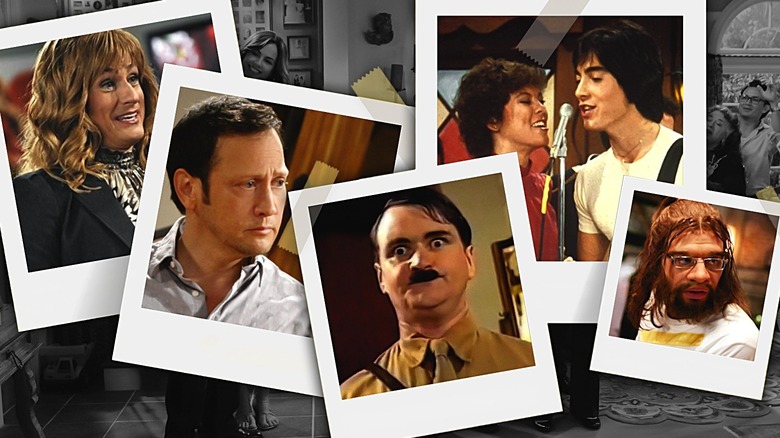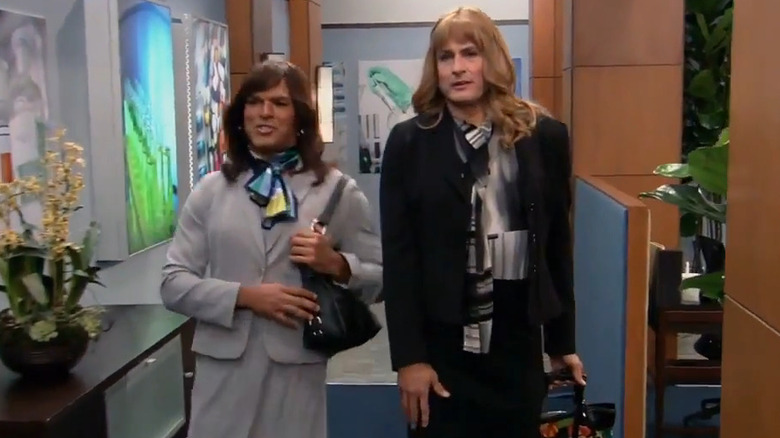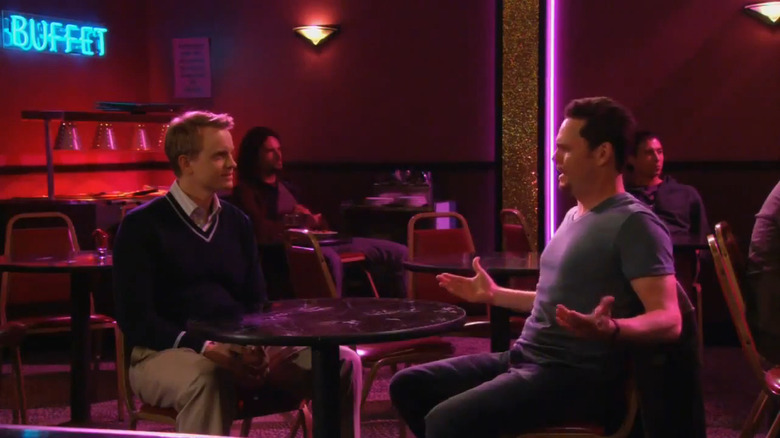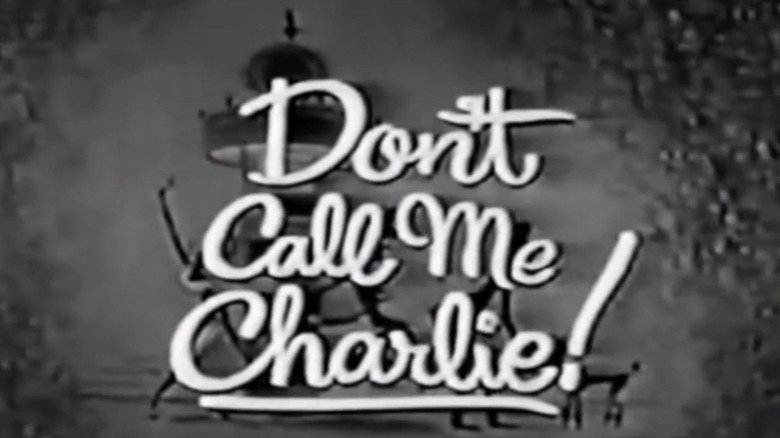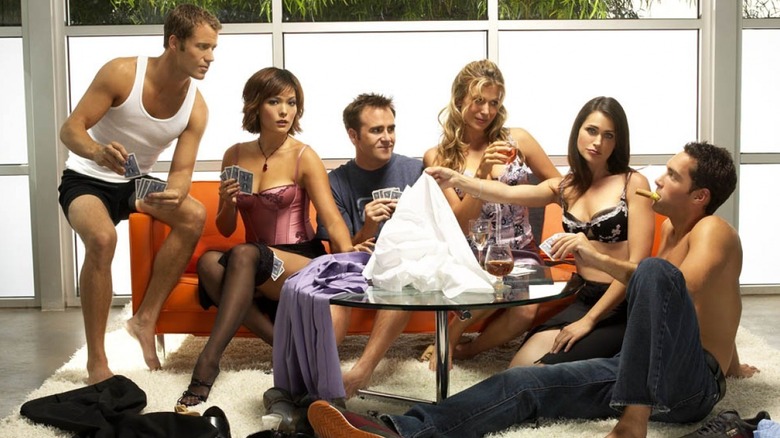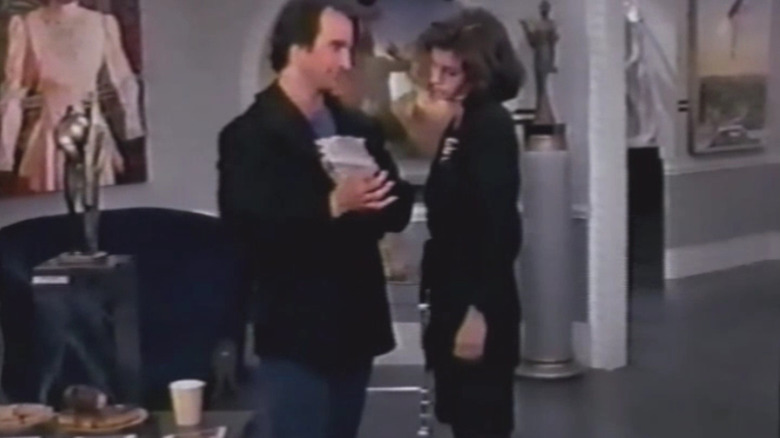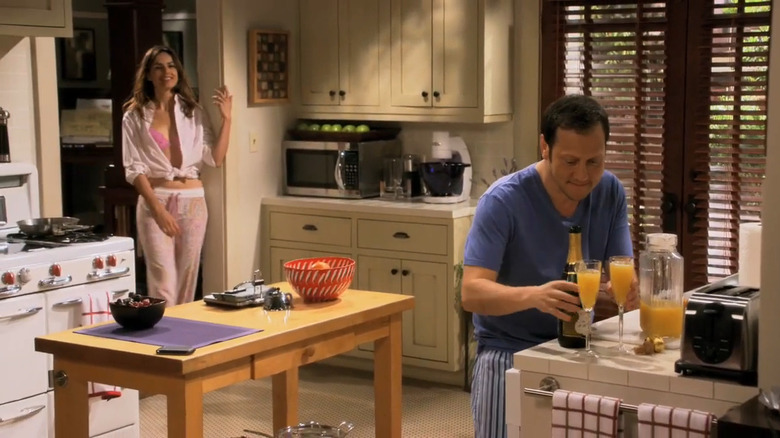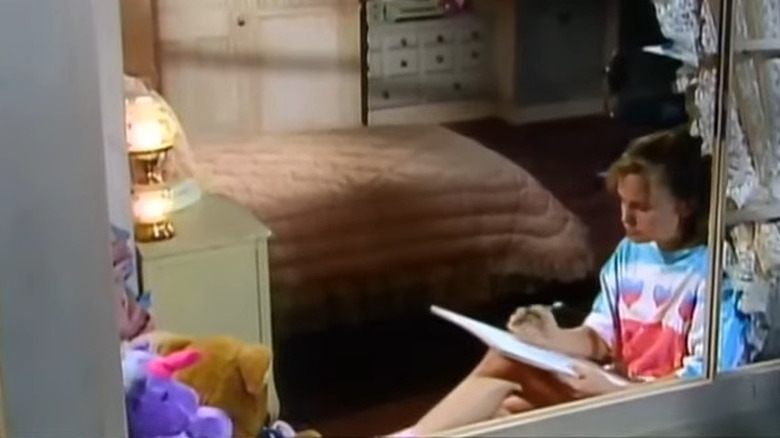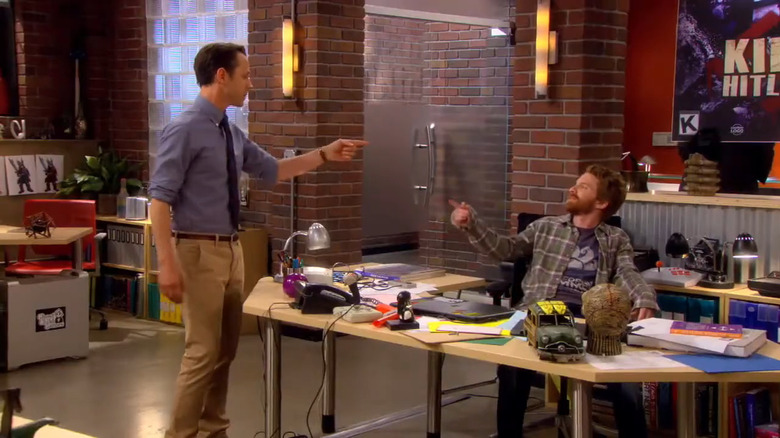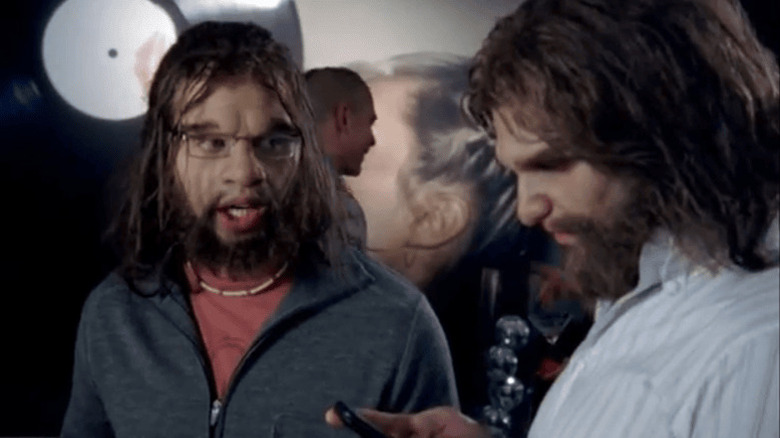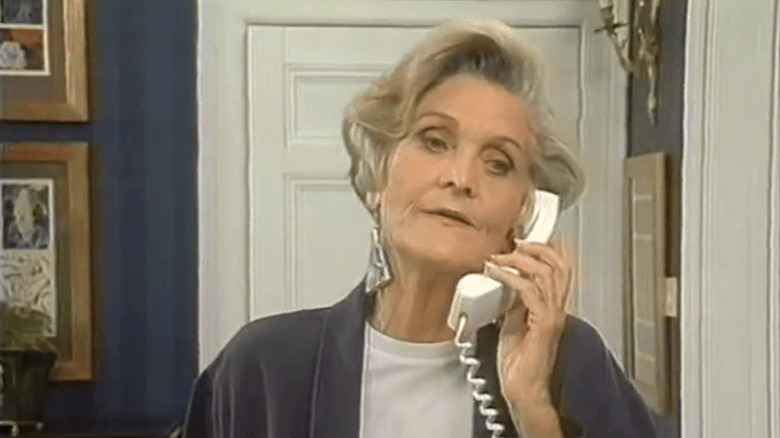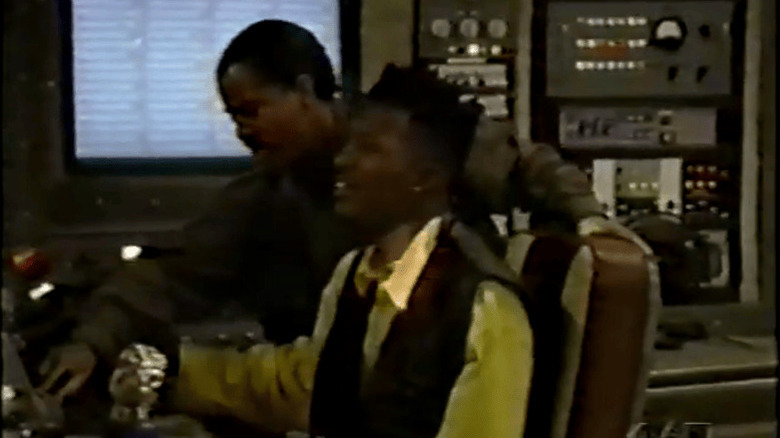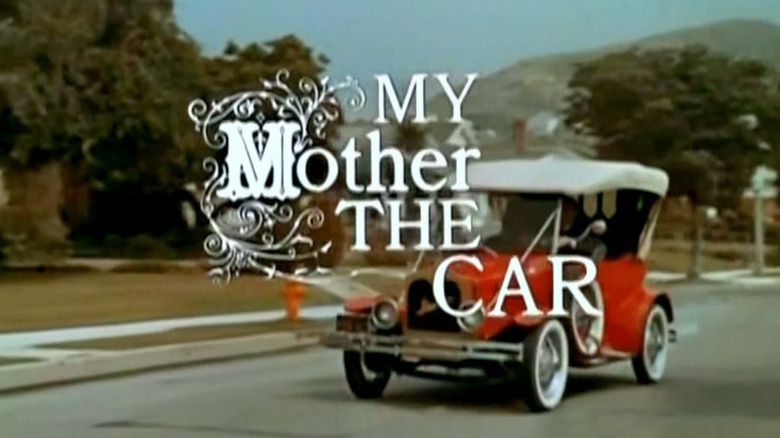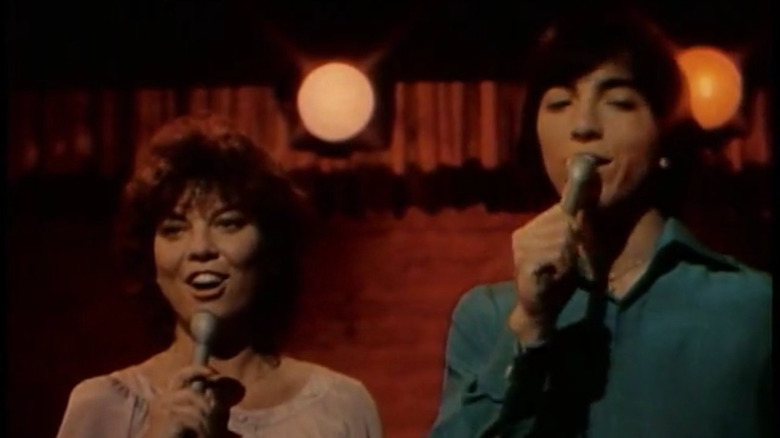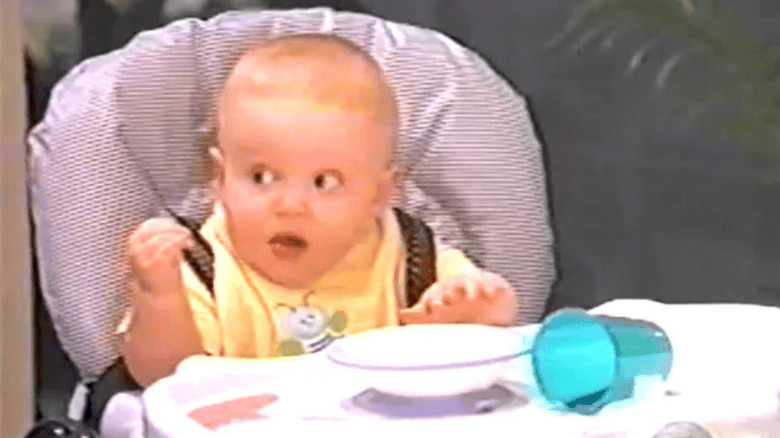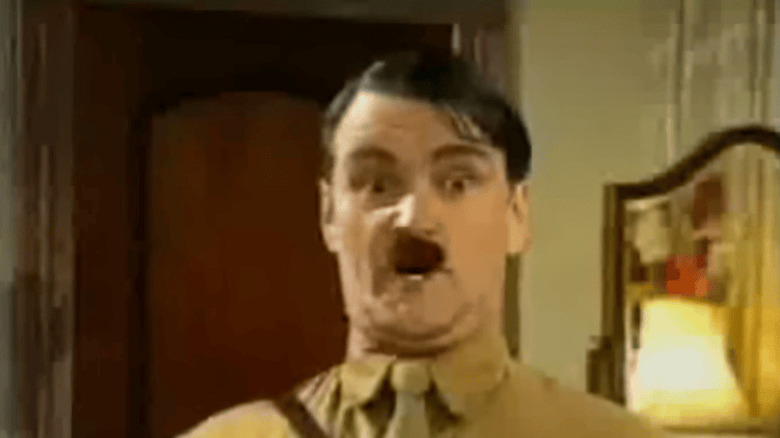The 15 Worst Sitcoms Of All Time
It's kind of interesting: As hard as it is to create one of the greatest shows of all time, it also feels like you have to put in some serious work to make a TV series so bad that it stands out against not just the best shows, but the vast sea of mediocrity that makes up a lot of television sitcoms. There are a lot of decent or average shows that get to retire with their reputations more or less intact, while bile is reserved for a select few truly heinous programs.
These are the worst of the worst. Often lasting a season (or less, in some circumstances), they combine bad judgment, weak performances, and egregious writing to create something that lingers in the minds of audiences — and not in a good way. Feast your eyes on these rare creatures: They are worthy of our pity, not our derision. How did things go so wrong in so many different ways? Read on to find out.
Work It
Crossdressing isn't exactly new territory in the world of the American sitcom: "Bosom Buddies" was doing it with Tom Hanks and Peter Scolari all the way back in the early '80s. But if you're going to try to create a comedy revolving around men dressing as women in the year of our lord 2012, it has to be incandescently funny and groundbreaking to have a chance of succeeding. This, we regret to say, was not the case for "Work It."
Running from January 3rd to January 10th, 2012 (yes, you read that correctly — a single week), "Work It" starred Ben Koldyke and Amaury Nolasco as two men who pretend to be women so that they can get jobs as pharmaceutical reps — in this twisted universe, they claim that being a man is a disadvantage in the process of getting a job (this has not been true ever in the history of the world).
"Work It" was thoroughly eviscerated by critics, with Robert Bianco of USA Today calling it "witless, tasteless, poorly acted, abominably written, clumsily directed, hideously lit and badly costumed." Two episodes were aired before it was unceremoniously canceled by ABC, who presumably hoped we would forget it ever existed. We didn't.
How To Be a Gentleman
"How to Be a Gentleman" is sort of like "The Odd Couple," except with more dated sexual politics and less endearing performances. It stars David Hornsby (who you may recognize as Rickety Cricket from "It's Always Sunny in Philadelphia") as a buttoned-up Dear Abby-style columnist, who inexplicably befriends an old high school classmate, Broseph McBroerson (OK, so his name is actually Bert Lansing, but Broseph is for sure more fitting). He somehow imagines that he'll be able to "My Fair Lady" Bert (Kevin Dillon), while Bert wants to give him man lessons. As you might predict, chaos ensues.
Even with the tremendously popular "The Big Bang Theory" as a lead-in, "How to Be a Gentleman" couldn't manage to attract audiences. People were weary of its regressive ideas about men and women, and the numbers reflected that disinterest. After three episodes, it was canceled, with the production order being cut from 13 to nine, bringing to an end a flawed concept that was executed badly.
Don't Call Me Charlie!
There are plenty of great war TV shows from the '60s and '70s, with just "Hogan's Heroes" and "M*A*S*H" alone. Unfortunately, "Don't Call Me Charlie" is not one of them. It stars Josh Peine as Judson McKay, a small town yokel who's not so much a war vet as he is a vet of the dog and cat variety. Nonetheless, he's drafted into the army and set to Paris, where he's a fish out of water in every sense of the word.
The show was torn apart by Rick Du Brow of United Press International, who called it (among other things) a "witless, amateurish abortion" and claimed that "anyone who comes in contact with 'Don't Call Me Charlie' is bound to suffer." His gleeful evisceration of the show was a reflection of the larger critical consensus, and "Don't Call Me Charlie" was canceled partway through its first season, leaving a number of episodes unaired.
Coupling
There are a few things that by now, people should just know not to do. Never get involved in a land war in Asia. Never go in against a Sicilian when death is on the line. And never attempt to take a popular U.K. television series and retool it for American audiences, especially if you're not even going to bother changing the scripts. Unfortunately, the producers of the American version of "Coupling" had to learn this the hard way. On British television, "Coupling" was a smart, edgy comedy about men, women, and the inevitable relationship issues they seem to encounter. It's basically "Friends," but better.
But the American version was ... well, a trainwreck is a polite way of putting it. The humor just didn't transfer across the Atlantic, and the considerable charm that the original had was completely lost. To make matters worse, several NBC affiliates in more conservative parts of the United States refused to air the show, citing its offensive content. It lasted just four episodes on the air before NBC pulled the plug, out of a total of 10 episodes that had been filmed.
The Trouble With Larry
Some of the best sitcoms tend to be pretty relatable. A group of friends going through madcap adventures in their outrageously large Manhattan apartments. A local bar where the regulars are more like a family. A bunch of office workers bravely trying to survive the most cringeworthy boss who perhaps has ever existed. Not so with "The Trouble With Larry" — it revolves around a man returning to the United States after being missing for a decade when he was attacked by a troop of baboons while on his honeymoon. (We hate it when that happens.)
When Larry (Bronson Pinchot) arrives stateside, he discovers that his wife has moved on and now has a new husband and daughter. So naturally, he shifts his attention to her younger sister, played by a pre-"Friends" Courteney Cox. The outlandish premise was exacerbated by a comedic style completely lacking in anything resembling humor, and "The Trouble With Larry" was canceled after three episodes, leaving an additional four unaired.
Rob
To put it plainly, Rob Schneider does not have a great track record when it comes to TV series where he's supposed to be, perplexingly, the male romantic lead. Everything about him screams "kooky side character," yet he was granted not one, but multiple sitcoms, the worst of which is "Rob." In it, he plays an architect with OCD who impulsively marries a Mexican-American woman named Maggie (Claudia Bassols) and, by extension, becomes part of her slightly chaotic family. And if you think either the OCD or the Mexican-American family will be handled with anything but broad, borderline offensive stereotypes, we admire your optimism.
"Rob" ran for exactly eight episodes — CBS couldn't yank it from the air fast enough. It was roundly criticized for its depiction of Latino families, with Jace Lacob of The Daily Beast claiming that it "offers a wafer-thin appreciation and awareness of Mexican culture, one that doesn't go beyond guacamole and the occasional use of the Spanish endearment mija."
Out of This World
We had plenty of family shows in the '80s with strange child star gimmicks — robots, and the like — and "Out of This World" joined the club, albeit with less panache than its counterparts. It stars Maureen Flannigan as Evie, a seemingly ordinary girl who, on her 13th birthday, discovers that she's actually half alien. Her father (who we never see, but is voiced by Burt Reynolds), lives out amongst the stars and is only accessible via a mysterious phone that allows the two to communicate. Since her mother is human, she's left to explore her new extraterrestrial powers alone, with only occasional guidance from her father.
Now, there's a lot you can do with this concept, but unfortunately, "Out of This World" fails to capitalize on any of it. The biggest shock of the show is that it somehow managed to drag itself along for four seasons, despite receiving nothing but derision from critics between 1987 and 1991.
Dads
Seth MacFarlane has never been a stranger to courting controversy, but even he couldn't overcome the tidal wave of criticism leveled at his misguided comedy, "Dads," which he executive produced in 2013. It stars Giovanni Ribisi and Seth Green as the owners of a video game company, both struggling with their relationships with their fathers (played by Martin Mull and Peter Riegert, respectively), who have made the only-in-sitcom-world decision to move in with their sons.
Neither of the dads are what you might call politically correct, and that was a big part of the problem — the show relishes its dated humor with jokes that hinge entirely on racist or sexist stereotypes rather than a punchline. For example, they have an Asian administrative assistant Veronica (Brenda Song), who basically just exists for them to make ethnic jokes about. Somewhere along the line, you vaguely get a sense that this is supposed to be edgy, with the two lead characters in on the joke, but it's all executed so poorly none of that comes through. It lasted 19 episodes before being taken out behind the proverbial barn and shot by Fox, which frankly is more than it deserved.
Cavemen
Remember the excellent Geico commercials with urbane modern-day cavemen being constantly victimized by the car insurance company's slogan, "So easy, a caveman can do it?" Well, they were incredibly popular in the early 2000s, and somewhere along the line, someone got a little cocky. They started thinking that the internal universe of the commercials was so clever that they could totally support an entire sitcom. Thus, "Cavemen" was born, operating as a punchline even before the show started airing. It revolved around a trio of cavemen in a world that sees them as less than the Homo sapiens they reluctantly coexist with.
To be fair, the production had a solid comedic cast, with Nick Kroll, Sam Huntington, and Bill English hidden behind extensive facial prosthetics. But they were wasted in "Cavemen," which was never quite as smart as it thought it was. In hindsight, was it a mistake to have people dressed up as primitive man — one of the most enduring and harmful stereotypes about Black people — as an allegory for the prejudice faced by the Black community in America? To be honest, that probably should have been obvious without hindsight.
The Brighton Belles
We've talked about when British productions are rebooted in the United States for an American audience, but what about when that happens in reverse? It's usually still a mistake, unfortunately, and you need look no further than "The Brighton Belles" to see why. "Golden Girls" was an astonishing popular show while it was on the air from 1985 to 1992, capturing the lives of a group of middle-aged women with humor and empathy while giving us one of the most touching examples of female friendship on TV. So it makes sense — in theory — that a producer from ITV would think, "Hey, it works over there, why wouldn't it also work for British audiences?" And thus "The Brighton Belles" was born.
The show is pretty much a carbon copy of "Golden Girls," with the middle-aged Frances (Sheila Hancock) renting out two rooms in her house to two other women, only to have the situation descend into chaos when one of her boarder's mother moves in as well. The biggest problem is that U.K. audiences were already able to watch "Golden Girls," so they had no use for an inferior version just because it was set in the U.K. "The Brighton Belles" was canceled after 11 episodes.
Homeboys in Outer Space
Honestly, just the title of this show kind of clues you into the fact that it's probably not going to be the next "Living Single" or "Seinfeld." "Homeboys in Outer Space" was set two hundred years in the future, when Ty (Flex) and Morris (Darryl M. Bell) fly around the galaxy getting into all sorts of shenanigans. But although it's set in the future, its humor is very much of the past — it's filled with dated jokes that you can see coming a mile away and hardly elicit a chuckle.
Furthermore, despite the fact that it was released in the '90s, which we could argue in retrospective was a mini-golden age for Black-led television, it feels quite regressive. A 1997 review in The Progressive by Fredrick L. McKissack, Jr. described the show as "'Star Trek' meets 'Amos 'n' Andy'," bemoaning it as just another example of how thoroughly the Black community was being let down by sitcoms that were supposed to be for them. "Homeboys in Outer Space" finished out its first season on UPN, but was promptly canceled after that.
My Mother the Car
Look, we've got nothing against talking cars. They can be a lot of fun. Herbie, KITT — all winners in our book. But then there's "My Mother the Car," and, well ... Freud would have a field day. It stars Jerry Van Dyke (younger brother of sitcom legend Dick Van Dyke in a role he turned down "Gilligan's Island" for) as David Crabtree, a lawyer who finds himself in the market for a used car. But the little scamp goes rogue, and instead of getting a nice, reliable Honda or something, he ends up taking home a 1920s touring car — hardly a practical choice.
Why does he buy this car, you may ask. Well, it's because it happens to be the mechanical reincarnation of his dead mother, who speaks to him through the car's radio. Honestly, there's a world in which this is a really fun show with an absurdist sense of humor. But unfortunately, we don't live in that world. Although there were plenty of fantasy-based sitcoms in the early '60s, "My Mother the Car" was a bridge too far for most audiences, and it lasted only one season.
Joanie Loves Chachi
It's almost impressive how thoroughly "Joanie Loves Chachi" was able to squander all of the good will built up by years of "Happy Days." It was a universally beloved sitcom during nearly its entire run, even if it is responsible for giving us the expression "jumping the shark." Joanie (Erin Moran) was the younger sister of "Happy Days" mainstay Richie Cunningham (Ron Howard), and Chachi (Scott Baio) was a rebellious cousin of Fonzie (Henry Winkler), brought onto the show to court a younger demographic as the Fonz began to grow older and more responsible.
When "Happy Days" was beginning to wind down in the early '80s, the production team thought it would a great idea to spin off these two popular characters and give them their very own show. Unfortunately, it turned out that Joanie and Chachi — dating and pursuing a career as musicians in Chicago — worked much better within the ensemble cast of "Happy Days," and didn't really have the steam to go out on their own. When it was moved to a new night in its second season, losing the powerful lead-in of "Happy Days" airing directly before it, "Joanie Loves Chachi" floundered in a big way and lost its chance to be remembered as one of the best TV spin-offs of all time — quite the opposite.
Baby Bob
At this point, can we just make it a rule that characters from popular commercials don't need their own sitcoms? We're begging you: Let them shine in a 30-second format and leave well enough alone. The character of Baby Bob got its start in 2000, when it was featured in commercials for Freeinternet.com. The schtick was that there was this cute little baby, but he spoke like an adult through a creepy CGI mouth. Naturally, someone thought this would be the perfect subject for a network sitcom.
Airing on CBS beginning in 2002, "Baby Bob" revolved around two parents who realize, to their considerable shock, that their infant son speaks like an adult man. Audiences at the time apparently found this just as unsettling as we do, and the show only lasted nine episodes, with five others unaired. But if you're worried about Baby Bob himself, have no fear — Baby Bob always lands on his feet. The following year, he was recruited as spokesperson for a new series of commercials from Quiznos.
Heil Honey I'm Home
It's difficult to imagine why audiences weren't necessarily thrilled to watch a spoof of the family sitcom with Adolf Hitler and Eva Braun getting into wacky hijinks with their Jewish next-door neighbors. Just kidding — it's probably one of the least difficult things to imagine. "Heil Honey I'm Home" — and honestly, that name alone should have been enough to get several people fired and possibly sent to comedy jail — has developed a reputation over the years as being arguably the most misguided sitcom in all of television history.
It was intended to be a joke, making fun of ridiculous TV shows from the '50s (it even opens with a title card giving the fictional backstory of the show, explaining that "Heil Honey I'm Home" was an abandoned series from that era). And if it was a sketch on "Saturday Night Live" or "Mad TV," okay, maybe it would have worked. But they actually tried to make an entire series around what is a one-joke premise, and an offensive one at that. It was one of only a handful of sitcoms to be canceled after a single episode, which is only fitting for such a thoroughly ill-judged television series.
